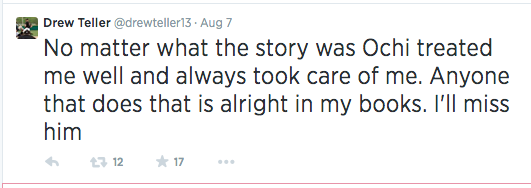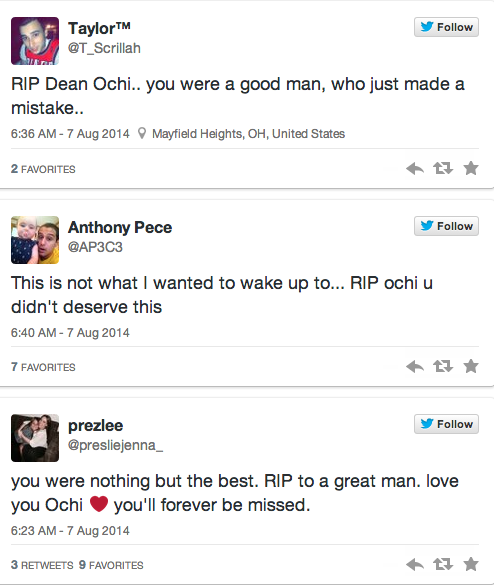Trigger Warning:Ephebophilia, Suicide, Victim-Shaming
In the early hours of August 7th, 2014 Dean Ochi, 43, took his own life. Ochi, a contracted athletic trainer at Mayfield High School, who worked for the Cleveland Clinic, had been indicted on August 5th on fourteen felony counts including sexual battery and sex crimes with a minor.
According to Cleveland’s Fox 8 News, an investigation began in April regarding sexual relations between Ochi and a then 17 year old student, after the student told a friend who reported the relationship to authorities. Detectives on the case found, among other things, nude photos of Ochi and the girl, as well as hundreds of text messages between the two.
This was not the first time Dean Ochi had been the center of ephebophilic controversy. In 2003, in response to a letter from the school’s principal, Ochi acknowledged that he had made poor decisions when he put his arms around a girls waist, massaged a student under her shirt, gave out private contact information, and wrestled with a female student on the ground.
When I read about Dean Ochi's self-inflicted death, I experienced multiple emotions. Having lost my father to suicide in 2009, and having found out some less than positive information about him, post mortem, I immediately felt innate sympathy for the daughter and wife and family he has left behind. No one should have to experience the pain that they have. However, above all, I felt livid at the cowardice he showed, outraged by the fact that he no longer will have to face the consequences for his actions.
When Ochi’s death was released to the public, it was not hard to find people’s opinions on the matter. As is common with younger generations, students from Mayfield High School took to social media to express their sentiments on the matters at hand. While some showed sympathy for his family and friends and mourned the loss of someone they considered a loved one, others took the events as an opportunity to defend his morality and his honor; others took the opportunity to blame the victims for the outcome, saying that if they had not come forward, he would still be alive.
Many people made statements similar to:

And:

Are they kidding me? Are they literally making a joke? I do not remember the last time I made the “mistake” of breaking the law and becoming a felon. I question the morals of people who would call someone who sexually assaulted their classmate – a minor at the time – a good guy, or “the man”. When they say things like this, they are essentially saying the victim's claims are invalid.
I think that reasonable and responsible adults would comprehend this issue and come to the conclusion that this man abused his position of power and trust. The people who are defending him are NOT reasonable and responsible adults. It does not matter that they are over the age of 18.
Other students made statements like:

If one defends another’s actions (especially toward a minor) simply because they were not committed against themself, they do not deserve to be called an adult. This is one of what I believe to be societie's greatest downfalls. The indifferent, apathetic, blasé attitude runs rampant amongst so many people, where unless a crime is committed in a way that directly impacts the individual, it's as if it does not exist.
The thing about truth, is that it is fact, and it is what it is regardless of opinion. Their opinion on him does not change the fact that he was an accused ephebophile.

Many of those who have come out in support of Ochi made statements about how one mistake (try 14+) should not have had such an affect on his life, as if implying that he should not have had consequences for his crime. That would be like murdering someone, getting caught, and then walking free because “it was just one mistake”. Like for most people who intentionally break the law, it was not a mistake for Ochi until he got caught. He was well aware of his actions, well aware of the magnitude of the situation, but still chose to act and then chose not to face the penalties.
I have also encountered those who feel the need to defend him on the basis that and indictment is a formal charge and not a conviction. While this is true, sufficient evidence is needed in order for an indictment to be made. In order for indictment to happen, a case must be voted upon by a grand jury, based on whether or not it is convictable. So, here’s the thing, they had the evidence. They police had text messages and nude photos. Not only this, but if he was not guilty and this was all just a scandal, why would he not have tried to fight it? Suicide is not the response of an innocent man, in my opinion.
By no means am I saying that the students that were close to him, his friends, and his family should not mourn his death. They have every right to, and they should. However using his death to deflect from very serious allegations will do more harm than good.
Maybe I am a bit unsympathetic, but an accused ephebophile took his own life, and there are people who take the time to defend him? They find it appropriate to defend that he chose to break the law repeatedly, and then made the choice to end his life instead of facing the penalties for his actions? I question for whom they find it sadder, the guy who no longer has to face the consequences for his actions or the multiple victims of his crimes? If you feel more for the ephebophile, you might want to check your priorities.
